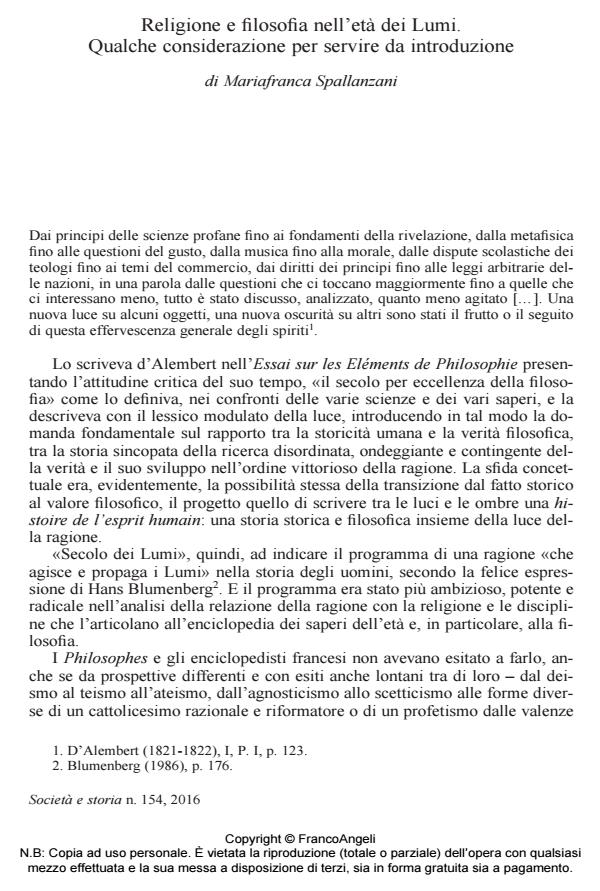Philosophy and Religion in the Enlightenment. Some Introductory Remarks
Journal title SOCIETÀ E STORIA
Author/s Mariafranca Spallanzani
Publishing Year 2017 Issue 2016/154 Language Italian
Pages 8 P. 631-638 File size 34 KB
DOI 10.3280/SS2016-154001
DOI is like a bar code for intellectual property: to have more infomation
click here

FrancoAngeli is member of Publishers International Linking Association, Inc (PILA), a not-for-profit association which run the CrossRef service enabling links to and from online scholarly content.
The conference organised in Bologna by Cesarina Casanova, Francesca Sofia and Vincenzo Lagioia (Dipartimento di Storia Culture Civiltà, 28-29 April 2014) has shown the complexity of the relationship between religion and culture in the Enlightenment, often considered as an irreligious or even atheistic movement. The analysys of a number of significant figures and themes has in fact pointed to a variety of attitudes and ideas, ranging from philosophy and biblical exegesis to political legislation, from ecclesiastical history to different literary genres.
Keywords: Religion, Enlightenment, philosophes, 18th century.
- Berlin I. (1979), Against the current. Essays in the history of ideas, London, Pimlico. Blumenberg H. (1986), Lebenszeit und Weltzeit, Frankfurt/Main, Suhrkamp Verlag
- (trad. it.: Tempo della vita e tempo del mondo, con un’Introduzione di G. Carchia, Bologna, il Mulino, 1996).
- D’Alembert J. (1821-1822), Essai sur les Eléments de Philosophie, Œuvres complètes de d’Alembert, I, Paris, A. Blin.
- Encyclopédie ou Dictionnaire raisonné des sciences, des arts et des métiers, par une société de Gens de Lettres. Mis en ordre et publié par M. Diderot [...] et quant à la partie mathématique par M. d’Alembert [...], Paris, Briasson, David, Le Breton, Durand, 1751-1765.
- Dieckmann H. (1948), Le philosophe. Texts and Interpretations, Washington University Studies, Language and Literature, n. 18, St. Louis.
- Foucault M. (1984), Qu’est-ce que les Lumières?, in Dits et Ecrits, tome IV, Paris, Gallimard, pp. 562-578.
- Markovitz F. (1986), L’ordre des échanges, Paris, Puf.
- Masseau D. (2000) Les ennemies des philosophes. L’antiphilosophie au temps des Lumières, Paris, Albin Michel.
- McMahon D. (2001), Ennemies of the Enlightenment, the French Counter-Enlightenment and the Making of Modernity, Oxford, Oxford University Press.
- Mori G. (2003), César Cheasneau Du Marsais, Le Philosophe, in «Studi settecenteschi», 23, pp. 9-60.
- Mothou A., Mori G. (a cura di) (2010), Philosophes sans Dieu. Textes athés clandestins du XVIIIe siècle, Paris, Champion.
- Spallanzani M. (2011), «Siamo uomini prima di essere cristiani». Religione ed Encyclopédie, in M. Geuna, G.B. Gori (a cura di), I filosofi e la società senza religione, Bologna, il Mulino, pp. 199-236.
- Zaganiaris J. (2006), Les Anti-Lumières: Une tradition du XVIIIe siècle à la Guerre froide, Paris, Gallimard.
- Zaganiaris J. (2009) Qu’est-ce que les “Contre-Lumières”?, in «Raisons politiques», vol. n. 35.
- Zaganiaris J. (2014) Histoire et lumières: Changer le monde par la raison. Paris, Albin Michel.
- Quale storia della società? Uno sguardo sull'epoca moderna Paola Bianchi, in SOCIETÀ E STORIA 178/2023 pp.711
DOI: 10.3280/SS2022-178005
Mariafranca Spallanzani, Religione e filosofia nell’età dei Lumi. Qualche considerazione per servire da introduzione in "SOCIETÀ E STORIA " 154/2016, pp 631-638, DOI: 10.3280/SS2016-154001